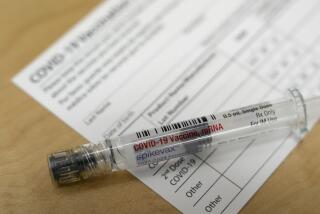2.6 Million Extra Flu Shots Found
- Share via
WASHINGTON — As rhetoric over the shortage of flu shots intensified on the presidential campaign trail Tuesday, U.S. health officials said they had found an extra 2.6 million doses of vaccine, but they won’t be available until early next year.
“We’ve successfully worked through vaccine supply problems in the past and we’re doing so this time as well,” said Health and Human Services Secretary Tommy G. Thompson, contending that the nation would muster enough vaccine and antiviral medications to protect the most vulnerable Americans during the flu season. “We need all of us to take a deep breath.”
Thompson’s comments at a Washington news conference came as President Bush sought to reassure senior citizens in Florida that the administration was working to ease the crisis. Bush said his Democratic opponent, Sen. John F. Kerry, was playing on voters’ fears.
Thompson said the extra 2.6 million doses would be provided in January by Aventis Pasteur, the French drug maker that is already supplying the U.S. with 55 million flu shots this year. The January delivery would be well into the flu season, but before what Aventis executives said would be the peak in February and March.
All told, Thompson said, the U.S. would have about 58 million vaccine doses from Aventis and 2 million doses of FluMist nasal spray, a vaccine that has more restricted usage. That would still fall well short of the approximately 100 million doses Americans expected to have this year, though Thompson said enough antiviral medicine -- which can be used to treat the flu -- could be available to help 40 million people.
Officials said they were searching internationally for medications and were negotiating with ID Biomedical Corp. of Canada for 1.5 million shots.
Thompson said he would not declare a public health emergency, a suggestion from Sen. Frank R. Lautenberg (D-N.J.).
“The public health emergency would just create more confusion and not accomplish anything,” Thompson said.
The vaccine shortage emerged Oct. 5, after British regulators cited bacterial contamination and shut down a Liverpool vaccine factory owned by Chiron Corp. of Emeryville, Calif. The closure eliminated as many as 48 million doses slated to be shipped to the U.S.
In an interview on CNBC, Thompson said Chiron “should not be prosecuted” for failing to produce the expected vaccine. “What we have to do now is make sure next year Chiron gets the necessary capital to modernize the plant so we don’t have this problem next year.”
The Justice Department and the Securities and Exchange Commission are investigating Chiron, but they appear to be focusing on whether the firm properly disclosed the problems at the plant to investors. The news of the problems caused Chiron’s stock to plunge. The Justice Department late Tuesday declined to comment on Thompson’s statement.
While administration officials attempted to put their response to the vaccine disruption in the best light, the issue continued to be a hot topic in the presidential campaign. Democrats mounted sharp attacks on the White House’s handling of the problem, while Bush sought to ease public anxieties.
Campaigning in St. Petersburg, Fla., the president told seniors -- one of the high-risk groups for flu -- he was on top of the situation and that officials were “doing everything possible to help older Americans and children get their shots, despite the major manufacturing defect that caused this problem.”
For days, the Kerry campaign has been sending reporters e-mails arguing that the Bush administration “dropped the ball” on the flu vaccine shortage, citing warnings from the Government Accountability Office as far back as 2001 that the country was vulnerable if any of the few producers were unable to deliver vaccine.
A Kerry radio ad targeting Florida voters asks: “If they can’t even deal with the flu vaccine, how are they going to deal with bioterror vaccines? ... Four more years? They haven’t earned it. Not even close.”
Kerry’s fellow Massachusetts Democrat, Sen. Edward M. Kennedy, also pressed the attack, declaring in a statement: “The Bush administration is doing its best to put a happy face on a disaster, but the seniors waiting in long lines for dwindling supplies of vaccine know the truth: The administration botched the job of keeping America safe from flu.”
One analyst said the vaccine shortage could damage Bush politically. “It doesn’t take any sophistication about politics to grasp the basic point: Not enough vaccine, and it happened on the administration’s watch,” said Lawrence Jacobs, director of the 2004 Elections Project for the Hubert H. Humphrey Institute of Public Affairs at the University of Minnesota.
“This issue has the potential for becoming the poster child for the Kerry campaign theme that President Bush has dropped the ball.”
*
Times staff writer Maura Reynolds contributed to this report. Times wire services were used in compiling it.
More to Read
Get the L.A. Times Politics newsletter
Deeply reported insights into legislation, politics and policy from Sacramento, Washington and beyond. In your inbox twice per week.
You may occasionally receive promotional content from the Los Angeles Times.










